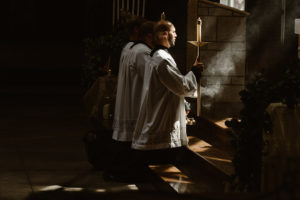Rules Are for Schmucks: Unshackle RICO
 Photo by Josh Applegate on Unsplash
Photo by Josh Applegate on Unsplash Hardly a day has gone by the past month without some major new development in the Catholic Church sex abuse scandal. First it was the demise of Cardinal McCarrick, followed by the stunning revelations of the Pennsylvania grand jury report and some at least moderately plausible allegations against the pope himself, including while he served as an archbishop in Argentina. (The pope is blaming Satan for his troubles.) Now law enforcement officials in seven other states are at different stages of launching Pennsylvania-style investigations into the organized criminal activity and cover-up perpetrated by the Catholic Church.
It’s questionable whether every allegation made against every individual named, including the pope, is true. It is beyond doubt, however, that the church has fostered an institutional culture of lawbreaking and cover-up. The most damning proof of this is the church’s own canon law, the extensive written rules governing every aspect of church operation. One rule flatly forbids doing anything in connection with investigating a complaint to create “scandal” that might cause the faithful (i.e., the suckers who give the bishops all their money) to reconsider their devotion. Another rule, Canon 1341, says that a bishop should penalize an abusive priest “only after he has ascertained that fraternal correction or rebuke or other means of pastoral solicitude cannot sufficiently repair the scandal, restore justice, [or] reform the offender.” Thus, every pedophile priest gets at least two bites at the apple. Moreover, a 1922 papal decree requires strict secrecy in any such internal investigation, lest the civil authorities get wind of it and start doing awful things like enforcing the law. A 1983 change in canon law threw up another roadblock: bishops were forbidden from dismissing pedophile priests—the only people who could do that were in the Vatican.
And how, you may wonder, does canon law penalize bishops who fail to report priest sex abuse to the Vatican? That’s an easy one to answer—there’s no penalty at all. On the contrary, Canon 1373 says that any person who “publicly incites…animosities or hatred” against the pope or a bishop running a diocese is to be punished by an interdict, one of the church’s harshest penalties (at least since they gave up torture).
The church bureaucrats who come up with canon law tend to be wordy. Another organization that shelters criminals, the Mafia, put it much more elegantly in their Code of Omerta: “He who is deaf, blind, and silent will live a hundred years in peace.” It worked wonderfully well for a long time.
In 1970, Congress decided to do something about the Mafia and other organized crime by enacting “RICO,” the Racketeer Influenced and Corrupt Organizations Act. RICO is powerful because it targets individuals who “operated or managed an enterprise through a pattern of racketeering activity.” You’re guilty under RICO if you enable or assist others to get their hands dirty committing crimes, whether or not you do so yourself. Moreover, RICO allows private individuals to bring civil lawsuits, with the tantalizing trophy of treble damages if they prevail.
The bottom line? RICO works. RICO cases resulted in virtually all of the top leaders of the New York City Mafia being sent to prison, for sentences far exceeding their life expectancies. Moreover, RICO’s scope is not limited to classic Godfather-style organized crime. Junk bond king Michael Milken was felled by RICO. Crooked police departments, crooked judges, crooked lawyers, and crooked politicians have all been brought to justice under RICO. Even the Crook-in-Chief has been nailed—Trump University paid a $25 million dollar settlement to avoid what may have been a far worse RICO fate.
So, can RICO be used to bring the bishops to justice? A lot of people—especially angry Catholics—are calling for exactly that. As well they should; after all, it’s their money being taken to compensate the victims, not the money of the high-and-mighty bishops. There’s a glimmer of hope that the US Department of Justice is considering this, and there’s also a possibility that one or more of the thirty-three states with a RICO statute will give it a whirl.
The big problem is that RICO isn’t set up to cover a sex abuse ring. It’s based on a list of “predicate” crimes, the enabling of which constitutes a RICO offense, but abusing children isn’t on the list. Ironically, distributing pictures of raping children is on the list, but actually raping them is not. Go figure.
Clever lawyers can try to twist and stretch the list of RICO predicate crimes to cover the vast Catholic cover-up, e.g. by alleging mail fraud. But that’s like fighting with one hand behind your back. Marci Hamilton, past recipient of the American Humanist Association’s Religious Liberty award, says the solution is simple: amend RICO, at both the federal and state level, to include child abuse in the list of predicate crimes. That same amendment, she points out, also needs to make clear that RFRA (the Religious Freedom Restoration Act) does not apply to RICO, or the God mouthpieces will be able to stymie prosecution at every stage of the process. In RFRA-free Chile there have been police raids this summer to seize sex abuse evidence from church offices. Shouldn’t we be able to do the same here?
Is the systematic cover-up of child abuse worse than what Michael Milken or Trump University did? Of course it is. The next time you encounter a federal or state legislator, ask them to sponsor a RICO amendment to force these arrogant schemers to defend what they did in open court. This ought to be a no-brainer.
